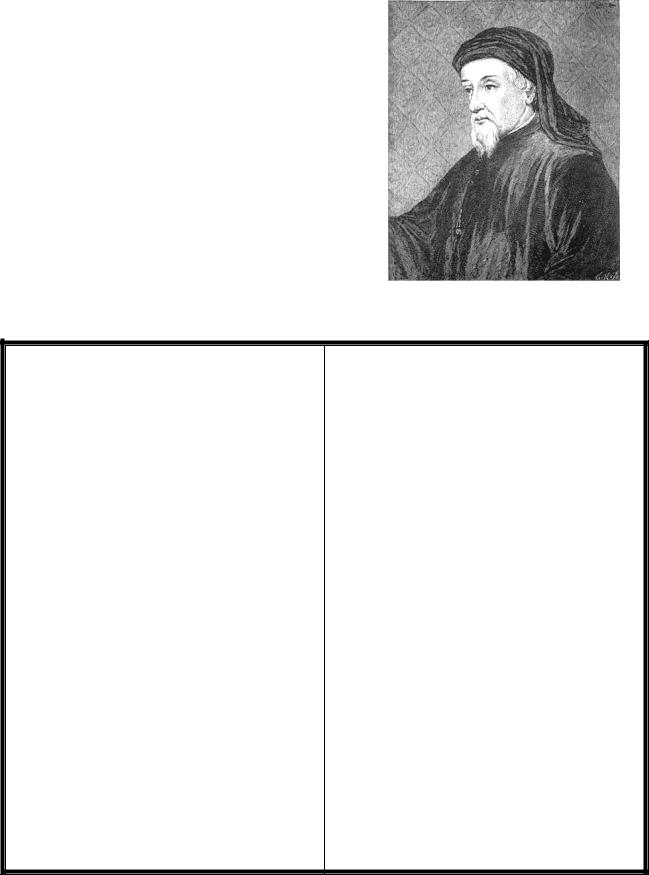
Английская поэзия XIV–XX веков
..pdf
|
|
|
|
|
|
|
22 |
|
|
|
|
|
|
The sheriff he saddled a good palfrey, |
И, если захочешь, тебе я продам |
|
|
|||
With three hundred pound in gold, |
Задешево сотню голов! |
|
|
|
||
And away he went with bold Robin Hood, |
Садится шериф на гнедого коня, |
|
|
|||
His horned beasts to behold. |
Три сотни червонцев берет |
|
|
|||
23 |
И едет верхом за лихим мясником |
|
|
|||
Away then the sheriff amd Robin did ride, |
В леса покупать его скот. |
|
|
|||
To the forrest of merry Sherwood; |
В Шервудскую чащу въезжают они – |
|
|
|||
Then the sheriff did say, God bless us this day |
Охотников славных приют. |
|
|
|||
From a man they call Robin Hood! |
– Спасименя, боже, – воскликнулшериф, – |
|
||||
24 |
Коль встретится нам Робин Гуд! |
|
|
|||
|
|
|
|
|
|
|
But when that a little further they came, |
По узкой тропе они едут вдвоем. |
|
|
|||
Bold Robin he chanced to spy |
И вдруг увидал Робин Гуд: |
|
|
|||
A hundred head of good red deer, |
Лесные олени меж темных ветвей |
|
|
|||
Come tripping the sheriff full nigh. |
От них врассыпную бегут. |
|
|
|||
25 |
|
|
|
|
|
|
“How like you my hornd beasts, good Master Sheriff? |
– Вот здесь и живет рогатый мой скот! |
|
||||
They be fat and fair for to see”; |
Тут несколько сотен голов. |
|
|
|||
“I tell thee, good fellow, I would I were gone, |
Коль можешь купить, – тебе уступить |
|
||||
For I like not thy company”. |
Я сотню-другую готов! |
|
|
|
||
26 |
|
|
|
|
|
|
Then Robin he set his horn to his mouth, |
Протяжно в рожок затрубил Робин Гуд, |
|
||||
And blew but blasts three; |
И разом явились на зов |
|
|
|
||
Then quickly anon there came Little John, |
Сдвухразных сторониМаленькийДжон, |
|
||||
And all his company. |
И семеро лучших стрелков. |
|
|
|||
27 |
|
|
|
|
|
|
“What is your will?” then said Little John, |
– Что скажешь? – спросил его Маленький Джон. |
|
||||
“Good master come tell it to me”; |
Каков твой приказ, Робин Гуд? |
|
|
|||
“I have brought hither the sheriff of Notingham, |
– Пожаловал к нам Ноттингамский шериф. |
|
||||
This day to dine with thee”. |
Пускай ему ужин дадут! |
|
|
|||
28 |
|
|
|
|
|
|
“He is welcome to me”, then said Little John, |
– Чтож, милостипросим, почтенныйшериф, |
|
||||
“I hope he will honestly pay; |
Тебя поджидаем давно. |
|
|
|
||
I know he has gold, if it be but well told, |
Отличным |
жарким |
мы тебя |
угостим. |
|
|
Will serve us to drink a whole day”. |
А ты нам плати за вино! |
|
|
|
||
29 |
|
|
|
|
|
|
Then Robin took his mantle from his back, |
Дрожащий шериф протянул кошелек, |
|
|
|||
And laid it upon the ground, |
Не молвив ни слова в ответ. |
|
|
|||
And out of the sheriffe['s] portmantle |
И так же без слов отсчитал Робин Гуд |
|
||||
He told three hundred pound. |
Три сотенки звонких монет. |
|
|
|||
30 |
|
|
|
|
|
|
Then Robin he brought him thorow the wood, |
Потом он |
шерифа |
повел за |
собой, |
|
|
And set him on his dapple gray; |
Опять посадил на коня |
|
|
|
||
“O have me commended to your wife at home”; |
И крикнул вослед: – Поклон и привет |
|
||||
So Robin went laughing away. |
Жене передай от меня! |
|
|
|
||
|
|
|
|
|
|
|
21

Robin Hood Rescuing Three Squires
There are twelve months in all the year, As I hear many men say,
But the merriest month in all the year Is the merry month of May.
Now Robin Hood is to Nottingham gone, With a link a down and a day,
And there he met a silly old woman, Was weeping on the way.
“What news? what news, thou silly old woman? What news hast thou for me?”
Said she, There 's three squires in Nottingham town
To-day is condemned to die.
“O have they parishes burnt?” he said, “Or have they ministers slain?
Or have they robbed any virgin,
Or with other men's wives have lain?”
“They have no parishes burnt, good sir, Nor yet have ministers slain,
Nor have they robbed any virgin,
Nor with other men's wives have lain”.
“O what have they done?” said bold Robin Hood, “I pray thee tell to me”:
“It's for slaying of the king's fallow deer, Bearing their long bows with thee”.
“Dost thou not mind, old woman”, he said, “Since thou made me sup and dine?
By the truth of my body”, quoth bold Robin Hood, “You could not tell it in better time”.
Now Robin Hood is to Nottingham gone, With a link a down and a day,
And there he met with a silly old palmer, Was walking along the highway.
“What news? what news, thou silly old man? What news, I do thee pray?”
Said he, Three squires in Nottingham town Are condemnd to die this day.
“Come change thy apparel with me, old man, Come change thy apparel for mine;
Робин Гуд и шериф
Двенадцать месяцев в году, Считай иль не считай.
Но самый радостный в году Веселый месяц май.
Вот едет, едет Робин Гуд По травам, по лугам И видит старую вдову
При въезде в Ноттингам.
–Что слышно, хозяйка, у вас в городке? – Старуху спросил Робин Гуд.
–Я слышала, трое моих сыновей
Пред казнью священника ждут.
–Скажи мне, за что осудил их шериф? За что, за какую вину:
Сожгли они церковь, убили попа, У мужа отбили жену?
–Нет, сударь, они не виновны ни в чем.
–За что же карает их суд?
–За то, что они королевскую лань Убили с тобой, Робин Гуд.
–Я помню тебя и твоих сыновей. Давно я пред ними в долгу.
Клянусь головою, – сказал Робин Гуд, – Тебе я в беде помогу!
Вот едет, едет Робин Гуд Дорогой в Ноттингам И видит: старый пилигрим Плетется по холмам.
–Что слышно на свете, седой пилигрим?
–Спросил старика Робин Гуд.
–Трехбратьевунас вНоттингамскойтюрьме На смерть в эту ночь поведут.
–Надень-ка одежду мою, пилигрим.
Отдай-ка свое мне тряпье, А вот тебе сорок монет серебром –
Ипей за здоровье мое!
–Богат твой наряд, – отвечал пилигрим, – Моя одежонка худа.
22

Here is forty shillings in good silver,
Go drink it in beer or wine”.
“O thine apparel is good”, he said, “And mine is ragged and torn; Wherever you go, wherever you ride, Laugh neer an old man to scorn”.
“Come change thy apparel with me, old churl, Come change thy apparel with mine;
Here are twenty pieces of good broad gold, Go feast thy brethren with wine”.
Then he put on the old man's hat, It stood full high on the crown:
“The first bold bargain that I come at, It shall make thee come down”.
Then he put on the old man's cloak,
Was patchd black, blew, and red;
He thought no shame all the day long
To wear the bags of bread.
Then he put on the old man's breeks, Was patchd from baliup to side;
By the truth of my body, “bold Robin can say”, “This man lovd little pride”
Then he put on the old man's hose, Were patchd from knee to wrist;
o “By the truth of my body”, said bold Robin Hood, “I'd laugh if I had any list”.
Then he put on the old man's shoes, Were patchd both beneath and aboon; Then Robin Hood swore a solemn oath, It's good habit that makes a man.
Now Robin Hood is to Nottingham gone, With a link a down and a down,
And there he met with the proud sheriff, Was walking along the town.
“O save, O save, O sheriff”, he said, “О save, and you may see!
And what will you give to a silly old man To-day will your hangman be?”
“Some suits, some suits”, the sheriff he said, “Some suits I'll give to thee;
Some suits, some suits, and pence thirteen To-day 's a hangman's fee”.
Над старым в беде и над нищим в нужде. Не смейся, сынок, никогда.
– Бери, старичок, мой богатый наряд. Давай мне одежду свою, И двадцать тяжелых монет золотых Тебе я в придачу даю!
Колпак пилигрима надел Робин Гуд, Не зная, где зад, где перед.
– Клянусь головой, он слетит с головы, Чуть дело до дела дойдет!
Штаны пилигрима надел Робин Гуд. Хорошие были штаны:
Прорехи в коленях, прорехи с боков, Заплата пониже спины.
Надел Робин Гуд башмаки старика И молвил: – Иных узнают По платью, а этого можно узнать, Увидев, во что он обут!
Надел он дырявый, заплатанный плащ, И только осталось ему Клюкой подпереться да взять на плечо Набитую хлебом суму.
Идет, хромая, Робин Гуд Дорогой в Ноттингам,
Ипервым встретился ему Шериф надменный сам.
–Спаси и помилуй, – сказал Робин Гуд.
– На старости впал я в нужду.
Иесли ты честно заплатишь за труд,
Ктебе в палачи я пойду!
–Штаны и кафтан ты получишь, старик, Две пинты вина и харчи.
Да пенсов тринадцать деньгами я дам За то, что пойдешь в палачи!
Но вдруг повернулся кругом Робин Гуд
Ис камня на камень – скок.
–Клянусь головою, – воскликнул шериф, – Ты бодрый еще старичок!
–Я не был, шериф, никогда палачом,
Ни разу не мылил петлю.
И будь я в аду, коль на службу пойду К тебе, к твоему королю!
23

Then Robin he turns him round about, And jumps from stock to stone;
“By the truth of my body”, the sheriff he said, “That's well jumpt, thou nimble old man”.
“I was neer a hangman in all my life, Nor yet intends to trade;
But curst be he”, said bold Robin, “That first a hangman was made”.
“I've a bag for meal, and a bag for malt, And a bag for barley and corn;
A bag for bread, and a bag for beef, And a bag for my little small horn”.
“I have a horn in my pocket, I got it from Robin Hood,
And still when I set it to my mouth, For thee it blows little good”.
“O wind thy hom, thou proud fellow, Of thee I have no doubt;
I wish that thou give such a blast Till both thy eyes fall out”.
The first loud blast that he did blow, He blew both loud and shrill;
A hundred and fifty of Robin Hood's men Came riding over the hill.
The next loud blast that he did give, He blew both loud and amain,
And quickly sixty of Robin Hood's men Came shining over the plain.
“O who are yon”, the sheriff he said, “Come tripping over the lee?”
“The're my attendants”, brave Robin did say, “They 'll pay a visit to thee”.
They took the gallows from the slack, They set it in the glen,
They hangd the proud sheriff on that, Releasd their own three men.
Не так уж я беден, почтенный шериф. Взгляни-ка на этот мешок:
Тут хлеба краюшка, баранья нога И маленький звонкий рожок.
Рожок подарил мне мой друг Робин Гуд. Сейчас от него я иду.
И если рожок приложу я к губам, Тебе протрубит он беду.
– Труби, – засмеялсянадменныйшериф, – Пугай воробьев и синиц.
Труби сколько хочешь, покуда глаза Не вылезут вон из глазниц!
Протяжно в рожок затрубил Робин Гуд,
Игулом ответил простор.
Ивидит шериф: полтораста коней С окрестных спускаются гор.
Иснова в рожок затрубил Робин Гуд, Лицом повернувшись к лугам,
Ивидит шериф: шестьдесят молодцов Несутся верхом в Ноттингам.
–Что это за люди? – воскликнул шериф.
–Мои! – отвечал Робин Гуд. –
К тебе они в гости явились, шериф, И даром домой не уйдут.
В ту ночь отворились ворота тюрьмы, На волю троих отпустив, И вместо охотников трех молодых Повешен один был шериф.
24

Geoffrey Chaucer
Geoffrey Chaucer (1343–1400), known as the Father of English literature, is widely considered the greatest English poet of the Middle Ages and was the first poet to have been buried in Poet's Corner of Westminster Abbey. While he achieved fame during his lifetime as an author, philosopher, alchemist and astronomer, Chaucer also maintained an active career in the civil service as a bureaucrat, courtier and diplomat. Among his many works, which include “The Book of the Duchess”, the “House of Fame”, the “Legend of Good Women” and “Troilus and Criseyde”, he is best known today for The Canterbury Tales. Chaucer is a crucial figure in developing the legitimacy of the vernacular (commonly spoken language), Middle English, at a time when the dominant literary languages in England were French and Latin.
The Canterbury Tales
Prologue (fragment)
Befell that, in that season, on a day In Southwark, at the Tabard, as I lay Ready to start upon my pilgrimage
To Canterbury, full of devout homage, There came at nightfall to that hostelry Some nine and twenty in a company
Of sundry persons who had chanced to fall In fellowship, and pilgrims were they all That toward Canterbury town would ride.
The rooms and stables spacious were and wide, And well we there were eased, and of the best. And briefly, when the sun had gone to rest,
So had I spoken with them, every one, That I was of their fellowship anon, And made agreement that we'd early rise To take the road, as you I will apprise.
But none the less, whilst I have time and space, Before yet farther in this tale I pace,
It seems to me accordant with reason To inform you of the state of every one Of all of these, as it appeared to me,
And who they were, and what was their degree, And even how arrayed there at the inn;
And with a knight thus will I first begin.
Кентерберийские рассказы Общий пролог (фрагмент)
Перевод И.А. Кашкина
Случилось мне в ту пору завернуть В харчевню «Табард», в Соуерке, свой путь Свершая в Кентербери по обету; Здесь ненароком повстречал я эту Компанию. Их двадцать девять было. Цель общая в пути соединила Их дружбою; они – пример всем нам –
Шли поклониться праведным мощам. Конюшен, комнат в «Табарде» немало,
Иникогда в нем тесно не бывало. Едва обильный ужин отошел, Как я уже со многими нашел Знакомых общих или подружился
Ипуть их разделить уговорился.
Ивот, покуда скромный мой рассказ Еще не утомил ушей и глаз, Мне кажется, что было бы уместно
Вам рассказать все то, что мне известно О спутниках моих: каков их вид,
Извание, и чем кто знаменит
Иль почему в забвенье пребывает; Мой перечень пусть Рыцарь открывает.
25

The Knight
A knight there was, and he a worthy man, Who, from the moment that he first began To ride about the world, loved chivalry, Truth, honour, freedom and all courtesy. Full worthy was he in his liege-lord's war, And therein had he ridden (none more far) As well in Christendom as heathenesse, And honoured everywhere for worthiness. At Alexandria, he, when it was won;
Full oft the table's roster he'd begun Above all nations' knights in Prussia. In Latvia raided he, and Russia,
No christened man so oft of his degree. In far Granada at the siege was he
Of Algeciras, and in Belmarie. At Ayas was he and at Satalye
When they were won; and on the Middle Sea At many a noble meeting chanced to be.
Of mortal battles he had fought fifteen, And he'd fought for our faith at Tramissene
Three times in lists, and each time slain his foe. This self-same worthy knight had been also
At one time with the lord of Palatye Against another heathen in Turkey:
And always won he sovereign fame for prize. Though so illustrious, he was very wise
And bore himself as meekly as a maid. He never yet had any vileness said,
In all his life, to whatsoever wight. He was a truly perfect, gentle knight. But now, to tell you all of his array,
His steeds were good, but yet he was not gay. Of simple fustian wore he a jupon
Sadly discoloured by his habergeon; For he had lately come from his voyage And now was going on this pilgrimage.
Рыцарь
Тот рыцарь был достойный человек.
Стех пор как в первый он ушел набег, Не посрамил он рыцарского рода; Любил он честь, учтивость и свободу; Усердный был и ревностный вассал. И редко кто в стольких краях бывал. Крещеные и даже басурмане Признали доблести его во брани.
Он с королем Александрию брал, На орденских пирах он восседал
Вверху стола, был гостем в замках прусских, Ходил он на Литву, ходил на русских, А мало кто – тому свидетель бог – Из рыцарей тем похвалиться мог.
Им в Андалузии взят Алжезир И от неверных огражден Алжир. Был под Лайасом он и Саталией
И помогал сражаться с Бельмарией. Не раз терпел невзгоды он и горе При трудных высадках в Великом море, Он был в пятнадцати больших боях; В сердца язычников вселяя страх, Он в Тремиссене трижды выходил
Сневерным биться, – трижды победил.
Он помогал сирийским христианам Давать отпор насильникам – османам,
Изаслужил повсюду почесть он. Хотя был знатен, все ж он был умен, А в обхожденье мягок, как девица;
Иво всю жизнь (тут есть чему дивиться) Он бранью уст своих не осквернял – Как истый рыцарь, скромность соблюдал. А что сказать мне об его наряде?
Был конь хорош, но сам он не параден; Потерт кольчугой был его камзол, Пробит, залатан, в пятнах весь подол. Он, возвратясь из дальнего похода, Тотчас к мощам пошел со всем народом.
The Canterbury Tales is a collection of over 24 stories written in Middle English by Geoffrey Chaucer at the end of the 14th century, during the time of the Hundred Years' War. The tales (mostly written in verse, although some are in prose) are presented as part of a story-telling contest by a group of pilgrims as they travel together on a journey from Southwark to the shrine of Saint Thomas Becket at Canterbury Cathedral. The prize for this contest is a free meal at the Tabard Inn at Southwark on their return.
Chaucer uses the tales and the descriptions of its characters to paint an ironic and critical portrait of English society at the time, and particularly of the Church.
26

The Prioress
There was also a nun, a prioress,
Who, in her smiling, modest was and coy; Her greatest oath was but “By Saint Eloy!” And she was known as Madam Eglantine. Full well she sang the services divine, Intoning through her nose, becomingly; And fair she spoke her French, and fluently, After the school of Stratford-at-the-Bow, For French of Paris was not hers to know. At table she had been well taught withal, And never from her lips let morsels fall, Nor dipped her fingers deep in sauce, but ate With so much care the food upon her plate That never driblet fell upon her breast.
In courtesy she had delight and zest. Her upper lip was always wiped so clean That in her cup was no iota seen
Of grease, when she had drunk her draught of wine. Becomingly she reached for meat to dine.
And certainly delighting in good sport, She was right pleasant, amiable – in short. She was at pains to counterfeit the look Of courtliness, and stately manners took, And would be held worthy of reverence. But, to say something of her moral sense, She was so charitable and piteous
That she would weep if she but saw a mouse Caught in a trap, though it were dead or bled. She had some little dogs, too, that she fed
On roasted flesh, or milk and fine white bread. But sore she'd weep if one of them were dead, Or if men smote it with a rod to smart:
For pity ruled her, and her tender heart. Right decorous her pleated wimple was;
Her nose was fine; her eyes were blue as glass; Her mouth was small and therewith soft and red; But certainly she had a fair forehead;
It was almost a full span broad, I own, For, truth to tell, she was not undergrown. Neat was her cloak, as I was well aware. Of coral small about her arm she'd bear
A string of beads and gauded all with green; And therefrom hung a brooch of golden sheen Whereon there was first written a crowned “A”, And under, Amor vincit omnia.
Аббатиса
Была меж ними также Аббатиса – Страж знатных послушниц и директриса. Смягчала хлад монашеского чина Улыбкой робкою мать Эглантина.
В ее устах страшнейшая хула Звучала так: «Клянусь святым Элуа». И, вслушиваясь в разговор соседний, Всё напевала в нос она обедню;
Ипо-французски говорила плавно, Как учат в Стратфорде, а не забавным Парижским торопливым говорком. Она держалась чинно за столом:
Не поперхнется крепкою наливкой, Чуть окуная пальчики в подливку, Не оботрет их о рукав иль ворот.
Ни пятнышка вокруг ее прибора. Она так часто обтирала губки, Что жира не было следов на кубке.
С достоинством черед свой выжидала, Без жадности кусочек выбирала. Сидеть с ней рядом было всем приятно – Так вежлива была и так опрятна. Усвоив нрав придворных и манеры, Она и в этом не теряла меры
Ивозбуждать стремилась уваженье, Оказывая грешным снисхожденье. Была так жалостлива, сердобольна, Боялась даже мышке сделать больно
Иза лесных зверей молила небо. Кормила мясом, молоком и хлебом Своих любимых маленьких собачек.
Ивсе нет-нет – игуменья заплачет:
Тот песик околел, того прибили – Не все собак игуменьи любили. Искусно сплоенное покрывало Высокий, чистый лоб ей облегало. Точеный нос, приветливые губки И в рамке алой крохотные зубки, Глаза прозрачны, серы, как стекло, – Всё взор в ней радовало и влекло. Был ладно скроен плащ ее короткий, А на руке коралловые четки Расцвечивал зеленый малахит.
На фермуаре золотой был щит
Скороной над большою буквой «А»,
Сдевизом: «Amor vincit omnia».
27

The Age of Sonnets
A sonnet is a 14-line poem with a special pattern of rhymes. There are two types of sonnet:
1.Italian, which consists of two 4-line and two 3-line stanzas and rhymes a – b – b – a, a – b – b – a, c – d – c, d – c – d;
2.English, or “Shakespearean”, which consists of three 4 – line and one double – line stanza and rhymes any way you like.
The sonnet genre first emerged in Italy, in the 13th century, and was made popular by Petrarch (1304–1374). But it was until the early 16th century that sonnets appeared in other European languages. The poet who introduced the sonnet in England was Thomas Wyatt, who used the Italian system of rhyming. But English grammar made it difficult to invent as many rhymes as the Italian form required, so the next step was taken by another poet, Henry Howard, Earl of Surrey. He was to simplify the rhyming pattern. So the true inventor of the “Shakespearean” sonnet was Surrey.
Philip Sidney
During the reign of Queen Elisabeth the Italian sonnet had not yet abandoned in England. It was still used by the greatest pre-Shakespearean poet – Sir Philip Sidney (1554–1586). If one needs a model of what an ideal Elizabethan character should be then Sidney is the one. He was a poet, a diplomat, a soldier and a courtier, all in one. He was as famous for his inborn nobility of mind as for his unhappy love with Penelope Devereux, daughter of the Earl of Essex. Sidney got into a heavy clash with Queen Elisabeth and was exiled. In 1581 he was allowed to return to London – just to discover that Penelope had been given in marriage to another man, Lord Rich, apparently against her will. Sidney was totally ruined. What he could do best was to make his personal catastrophe into poetry. His book of sonnets, “Astrophil and Stella”, tells the story of a man who is in love with a married woman. She is, however,
faithful to her husband and declines the hero’s attempts, which makes him admire her even more. While the names are fictional (Stella is “star” in Latin, and Astrophil “star-loving” in Greek), the autobiographic nature of the sonnets is recognisable.
Sidney’s death was as romantic as his life – he was killed in a military campaign in the Netherlands in 1586.
From Astrophil and Stella
|
|
|
|
|
Sonnet 1 |
Сонет 1 |
|
|
|
Перевод В. Рогова |
|
|
Loving in truth, and fain in verse my love to show, |
Пыл искренней любви я мнил излить |
|
|
That the dear She might take some pleasure of my pain: |
стихом, |
|
|
Pleasure might cause her read, reading might make |
Чтобмилуюразвлечьизображеньембед– |
|
|
her know, |
Пускайпрочтет, пойметисжалитсяпотом, |
|
|
Knowledge might pity win, and pity grace obtain, |
Имилостьявитмнезажалостьювослед. |
|
|
I sought fit words to paint the blackest face of woe, |
Чужие книги я листал за томом том: |
|
|
Studying inventions fine, her wits to entertain: |
Бытьможет, ямечтал, какой-нибудь поэт, |
|
|
Oft turning others' leaves, to see if thence would flow |
Мне песнями кропя, как благостным до- |
|
|
Some fresh and fruitful showers upon my sun – |
ждем, |
|
28

burned brain. |
Спаленный солнцем мозг, подскажет |
But words came halting forth, wanting Invention's stay, |
путь... Но нет! |
Invention, Nature's child, fled step-dame Study's blows, |
Мойслог, увы, хромал, отВыдумкидалек, |
And others' feet still seemed but strangers in my way. |
Над Выдумкою бич учения навис, |
Thus great with child to speak, and helpless in my |
Постылыбылимнесплетеньячуждыхстрок, |
throes, |
И в муках родовых перо я тщетно грыз, |
Biting my truant pen, beating myself for spite, |
Не зная, где слова, что вправду хороши... |
“Fool' said my Muse to me”, “look in thy heart and |
«Глупец! – был Музы глас. – Глянь в |
write”. |
сердце и пиши». |
Sonnet 39 |
Сонет 39 |
|
Перевод В. Рогова |
Come sleep, oh sleep, the certain knot of peace, |
Приди, о Сон, забвение забот, |
The baiting place of wit, the balm of woe, |
Уму приманка, горестей бальзам, |
The poor man's wealth, the prisoner's release, |
Свобода пленным, злато беднякам, |
Th'indifferent judge between the high and low; |
Судья бесстрастный черни и господ! |
With shield of proof shield me from out the prease |
От жгучих стрел твой щит меня спасет |
Of those fierce darts, Despair at me doth throw: |
О, воспрепятствуй внутренним боям |
Oh make in me those civil wars to cease; |
И верь, что щедро я тебе воздам, |
I will good tribute pay if thou do so: |
Когда прервешь междоусобья ход. |
Take thou of me smooth pillows, sweetest bed, |
Согласен я, чтоб ложе ты унес, |
A chamber deaf to noise and blind to light; |
Опочивальню тихую мою, |
A rosy garland, and a weary head; |
И тяжесть в веждах, и гирлянды роз; |
And if these things, as being thine by right, |
А если всё тебе я отдаю, |
Move not thy heavy Grace, thou shalt in me |
Но не идешь ты, как молю о том, |
Livelier than elsewhere Stella's image see. |
Лик Стеллы в сердце покажу моем. |
Sonnet 63 |
Сонет 63 |
|
Перевод Л. Темина |
Oh grammar rules, oh now your virtues show |
О правила грамматики! Вдвойне |
So children still read you with awful eyes, |
Пускай себя проявит ваша сила: |
As my young dove may in your precepts wise |
Не школяры (она им так постыла!), |
Her grant to me, by her own virtue know. |
Но милая ее докажет мне. |
For late, with heart most high, with eyes most low, |
Когда недавно, с ней наедине, |
I craved the thing which ever she denies: |
Опять запретной милости просил я, |
She, lightning Love, displaying Venus' skies, |
«Нет! Нет!» голубка дважды повторила, |
Lest once should not be heard, twice said, “No, No”. |
Страшась, что не расслышу я вполне... |
Sing then, my Muse, now Io Paean sing, |
Воспрянь же, Муза, и пеан пропой, |
Heav'n's envy not at my high triumphing: |
Забудьте зависть, Небеса, и мой |
But grammar's force with sweet success confirm: |
Успех триумфом увенчайте сразу: |
For grammar says (oh this, dear Stella, weigh,) |
Поскольку знают все со школьных лет, |
For grammar says (to grammar who says nay?) |
Что тот, кто свел в суждении два «нет», |
That in one speech two negatives affirm. |
Построил утвердительную фразу! |
|
|
29

William Shakespeare
William Shakespeare (26 April 1564 (baptised) – 23 April 1616). Shakespeare was born and brought up in Stratford-upon- Avon. He was an English poet and playwright, widely regarded as the greatest writer in the English language and the world's preeminent dramatist. He is often called England's national poet and the “Bard of Avon”. His extant works, including some collaborations, consist of about 38 plays, 154 sonnets, two long narrative poems, and a few other verses, the authorship of some of which is uncertain. His plays have been translated into every major living language and are performed more often than those of any other playwright.
|
|
|
|
|
|
|
|
|
Sonnet 90 |
Сонет 90 |
|
|
|
Перевод С.Я. Маршака |
|
|
Then hate me when thou wilt; if ever, now; |
Уж если ты разлюбишь – так теперь, |
|
|
Now, while the world is bent my deeds to cross, |
Теперь, когда весь мир со мной в раздоре. |
|
|
Join with the spite of fortune, make me bow, |
Будь самой горькой из моих потерь, |
|
|
And do not drop in for an after-loss: |
Но только не последней каплей горя! |
|
|
Ah! do not, when my heart hath 'scap'd this sorrow, |
|
|
|
Come in the rearward of a conquer'd woe; |
И если скорбь дано мне превозмочь, |
|
|
Give not a windy night a rainy morrow, |
Не наноси удара из засады. |
|
|
To linger out a purpos'd overthrow. |
Пусть бурная не разрешится ночь |
|
|
If thou wilt leave me, do not leave me last, |
Дождливым утром – утром без отрады. |
|
|
|
|
|
|
When other petty griefs have done their spite, |
Оставь меня, но не в последний миг, |
|
|
But in the onset come: so shall I taste |
Когда от мелких бед я ослабею. |
|
|
At first the very worst of fortune's might; |
Оставь сейчас, чтоб сразу я постиг, |
|
|
And other strains of woe, which now seem woe, |
Что это горе всех невзгод больнее, |
|
|
|
|
|
|
Compar'd with loss of thee, will not seem so. |
Что нет невзгод, а есть одна беда – |
|
|
|
Твоей любви лишиться навсегда. |
|
|
Sonnet 61 |
Сонет 61 |
|
|
Is it thy will thy image should keep open |
Твоя ль вина, что милый образ твой |
|
|
My heavy eyelids to the weary night? |
Не позволяет мне сомкнуть ресницы |
|
|
Dost thou desire my slumbers should be broken, |
И, стоя у меня над головой, |
|
|
While shadows like to thee do mock my sight? |
Тяжелым векам не дает закрыться? |
|
|
Is it thy spirit that thou send’st from thee |
Твоя ль душа приходит в тишине |
|
|
So far from home into my deeds to pry, |
Мои дела и помыслы проверить, |
|
|
To find out shames and idle hours in me, |
Всю ложь и праздность обличить во мне, |
|
|
The scope and tenour of thy jealousy? |
Всю жизнь мою, как свой удел, измерить? |
|
|
O, no! thy love, though much, is not so great: |
О нет, любовь твоя не так сильна, |
|
|
Чтоб к моему являться изголовью, |
|
|
|
It is my love that keeps mine eyes awake; |
Моя, моя любовь не знает сна. |
|
|
Mine own true love that doth my rest defeat, |
На страже мы стоим с моей любовью. |
|
|
To play the watchman ever for thy sake: |
|
|
|
For thee watch I whilst thou dost wake elsewhere, |
Я не могу забыться сном, пока |
|
|
From me far off, with others all too near. |
Ты – от меня вдали – к другим близка. |
|
|
|
|
|
30
